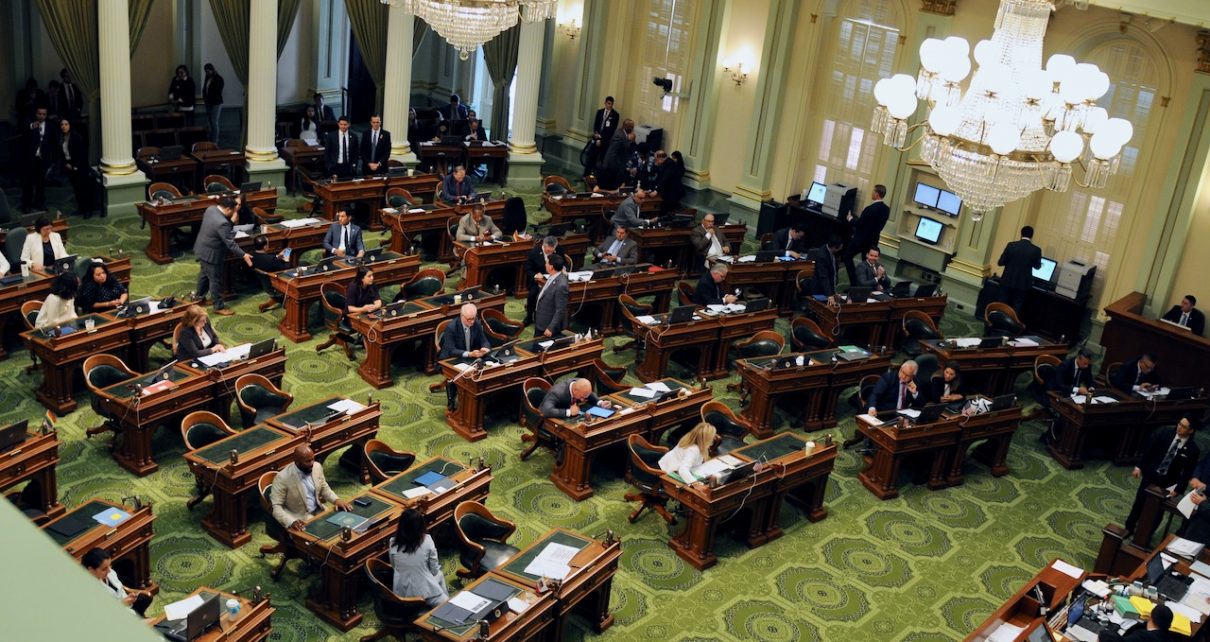
California State Assembly Chamber. (Photo: Kevin Sanders for California Globe)
What Is the Difference Between ‘Old’ and ‘New’ Laws?
To what does a ‘new law’ apply?
By Chris Micheli, June 12, 2022 2:40 pm
Did you know that California statutes utilize the terms “new” and “old” in referencing laws contained in the state’s 29 Codes? In fact, the term “new law” is used in at least fifty statutes. The term “old law” is used in about half a dozen statutes. And, the term “prior law” is used in over eighty statutes. So, what do these terms mean? There are only a few Codes that actually defines these three terms.
The Term “New Law”
In Family Code Section 4, “new law” means either of the following, as the case may be: (A) The act that enacted this code. (B) The act that makes a change in this code, whether effectuated by amendment, addition, or repeal of a provision of this code. The same language is found in Probate Code Section 3.
To what does a “new law” apply? For example, Family Code Section 4 provides that “the new law applies on the operative date to all matters governed by the new law, regardless of whether an event occurred or circumstance existed before, on, or after the operative date, including, but not limited to, commencement of a proceeding, making of an order, or taking of an action.”
Another example is that a person would be relieved from liability for actions taken before the operative date of the “new law” that was proper at the time the action was taken. Moreover, if the new law does not apply to a matter that occurred before the operative date, then the old law continues to govern the matter notwithstanding its repeal or amendment by the new law.
Then there are other definitions of the term, such as Corporations Code Section 2300 that provides the term “new law” means this division of the Corporations Code as amended by act of the California Legislature, 1975–76 Regular Session, effective January 1, 1977, and as in effect on that date. Similarly, Corporations Code Section 12690 defines the term “new law” to mean Part 2 (commencing with Section 12200) of Division 3 of Title 1 of the Corporations Code enacted by the California Legislature during the 1981–82 Regular Session and operative January 1, 1984
Financial Code Section 251 defines the term “new law” to mean the new General Corporation Law, subject, however, to the provisions of Section 101 of the revised Banking Law. So, there are broad and narrow definitions of the term. However, the term “new law” is generally used without a definition is most Code sections.
The Term “Old Law”
In Family Code Section 4, “old law” means the applicable law in effect before the operative date of the new law. The same language is found in Probate Code Section 3. Financial Code Section 31950 defines “old law” to mean Part 6 (commencing with Section 14200), Division 3, Title 1 of the Corporations Code, as added by Chapter 985 of the Statutes of 1975.
Then there is Financial Code Section 31951 that defines to term “prior law” to mean the old law. Isn’t that one helpful?
The Term “Prior Law”
Corporations Code Section 2300 that provides the term “prior law” means the applicable law as in effect prior to January 1, 1977. Similarly, Corporations Code Section 12690 defines the term “prior law” to mean Part 2 (commencing with Section 12220) of Division 3 of Title 1 of the Corporations Code in effect on December 31, 1983.
Financial Code Section 251 defines the term “prior law” to mean the prior General Corporation Law, subject, however, to the provisions of Section 101 of the prior Banking Law. Then there is Financial Code Section 31951 that defines to term “prior law” to mean the old law. However, the term “prior law” is generally used without a definition is most Code sections.
These three terms are most often found in Chapters contained in Codes that are titled “Transition Provisions.” They are obviously meant to assist in interpreting major changes in the law between “old/prior” and “new” laws.
- Probate Code Could Be a Basis for Statutory Interpretation Principles - February 22, 2026
- Conservation Banks - February 22, 2026
- Mergers of Unincorporated Associations - February 21, 2026





2 thoughts on “What Is the Difference Between ‘Old’ and ‘New’ Laws?”